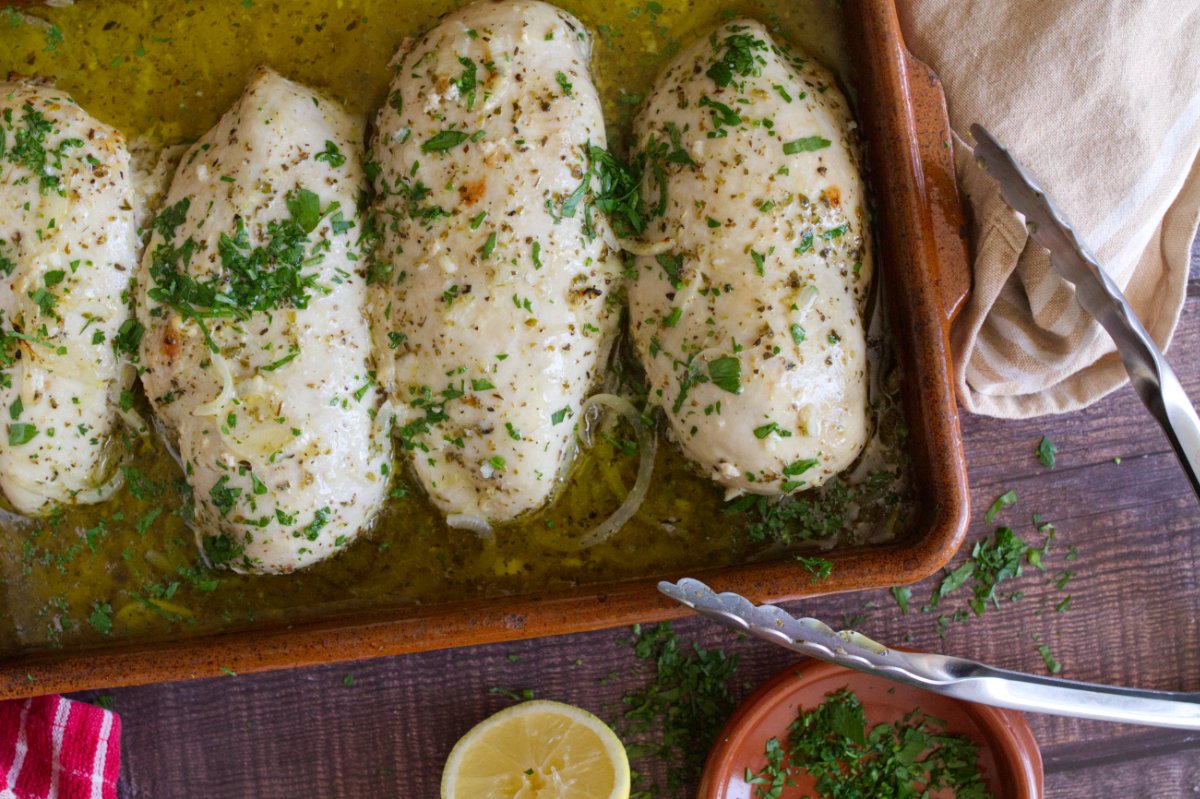The Perfect Summer Chicken Recipe
Once you try this Mediterranean chicken with a tangy olive oil and lemon marinade, I think you’ll be making it on repeat. Embracing the flavors of the Mediterranean, this super easy recipe uses tender, juicy chicken breasts that are marinated in our new favorite summer marinade that simply oozes goodness from the Med.
This is a classic olive oil and lemon marinade with just 6 ingredients. What I love about it is it pairs well with so many sides. It’s a delicious blend of tangy lemon flavors, rich smooth olive oil, garlic, and oregano, but isn’t overpowering and has a light, fragrant finish. The marinade takes under 1 minute to make and smells incredible when you put the chicken in the oven to bake!
Table of contents:
How to Make Mediterranean Chicken with a Tangy Olive Oil and Lemon Marinade:
Ingredients:
For the Chicken:
- 1 kg (32 oz.) Chicken breast meat
- 1 small white onion, sliced fine
- ½ glass of dry white wine
- 3-4 garlic cloves, loosely chopped
- Dash of oregano
- Fresh parsley (for garnish)
- 1 lemon, cut into wedges (optional)
For the Mediterranean Olive Oil Marinade:
(Makes ¾ US Cup / 170ml)
- 1/2 cup olive oil
- 1/4 cup fresh lemon juice
- 4 cloves garlic, minced
- 1 tablespoon dried oregano
- 1 tsp salt (we prefer fine Pink Himalayan Salt)
- 1/2 tsp black pepper
Equipment Needed
- Large casserole dish
- Small bowl (for mixing the marinade)
- Cooking tongs
- Garlic press
- Plastic food wrap
- Meat thermometer
Instructions:
Step 1 – Prepare Marinade
- Add the olive oil and lemon juice to a small bowl, and whisk until you see the ingredients begin to emulsify. This should only take around 10 seconds.
- Add the minced garlic, dried oregano, and salt and pepper.
- Whisk again for around 30 seconds.
Step 2 – Prepare and Marinate Chicken
- In a large oven-safe casserole dish, add a splash of oil to the bottom of the dish. Add the chicken breasts, sliced onion, and garlic.
- Drizzle with the olive oil and lemon marinade and mix well, rotating chicken breasts so they are covered evenly with the marinade. (Note: the onion and garlic will move to the bottom of the pan, this is good as it gives the chicken a better opportunity to cook evenly.
- Pour the white wine around the chicken breasts and sprinkle with a dash of dried oregano.
- Cover the dish with plastic food wrap and marinate in the fridge for around 3-4 hours*
Step 3 – Bake Chicken Breasts
- Preheat the oven to 425°F (220°C).
- Remove the chicken from the fridge and bring to room temperature. Cover with aluminum foil before baking.
- Bake the chicken breasts for 20-25 minutes, depending on their size.
- If you want to brown the meat, take the foil off for the last 5-10 minutes in the oven. Keep the foil though as you’ll need it when you rest the chicken.
- Use a meat thermometer and check for an internal temperature of 165°F (74°C).
- Loosely arrange the foil over the chicken, and let the chicken rest for 5-10 minutes before serving.
Cooking Notes:
- *3-4 hours is a recommended marinating time – see ‘Marinating Times’ in the recipe article for more information. You can leave it longer if you want a stronger flavor/more tender chicken-whatever happens.
- Extra Zing: Add a teaspoon of Dijon mustard to the marinade for an extra layer of flavor and a bit of tanginess.
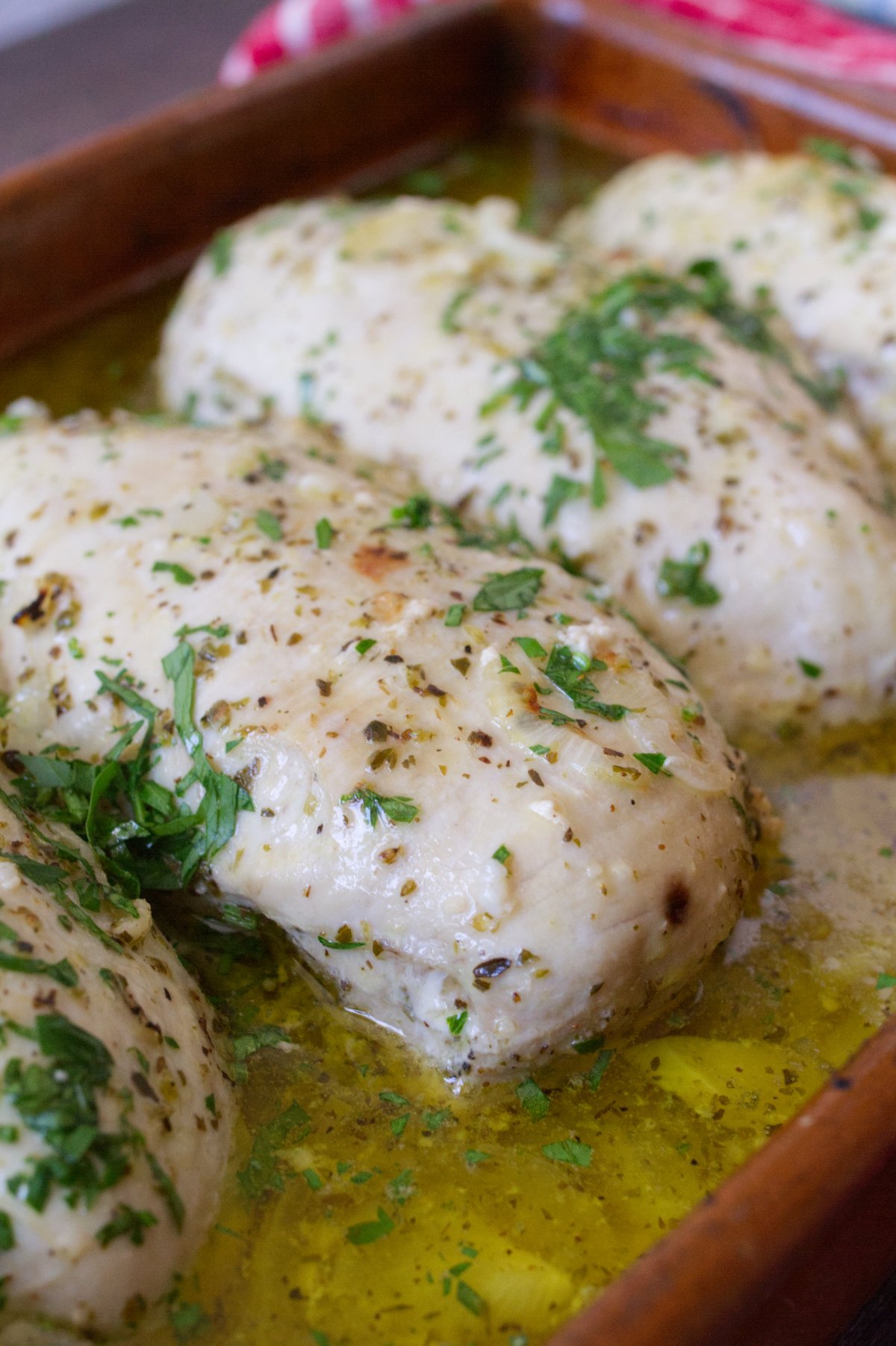
Ingredients and Substitutions
This recipe is so simple and is a classic Mediterranean marinade that’s made with olive oil, lemon juice, garlic, oregano, and a little seasoning.
Olive oil
Where possible, use extra virgin olive oil for its rich flavor characteristics and well-documented health benefits. I totally get that prices have sky-rocketed of late and are more expensive in some countries so use the best quality olive oil you can afford or source.
Lemon Juice
In keeping with classic Mediterranean cooking techniques that focus on fresh ingredients, use freshly squeezed lemon juice when making the marinade (this one’s a must, trust me). Here are a few reasons why I love to use fresh lemon juice when making marinades:
- It has a bright, vibrant flavor that bottled juice often lacks.
- It’s free from preservatives, artificial flavors, and stabilizers that are commonly found in bottled juices. These additives can alter the taste and quality of your marinade.
- The acidity of fresh lemon juice is consistent and natural, whereas bottled lemon juice might have added citric acid to standardize its pH, which can sometimes result in an overly harsh or artificial taste.
- When you squeeze fresh lemons, the oils from the peel are often incorporated into the juice, adding a fragrant, aromatic component to the marinade that makes it smell even more delicious.
Garlic
Again, another staple ingredient in many Mediterranean dishes, garlic will enhance the flavor and provide an extra kick. I highly recommend using fresh garlic for best results, but if you can’t source fresh garlic, you can use frozen minced garlic or garlic powder.
Oregano
Another staple in Mediterranean cuisine is oregano. I use dried oregano in this recipe which is stronger than fresh oregano. If you use fresh oregano, double the quantity. f in inch (1cm) in diameter.
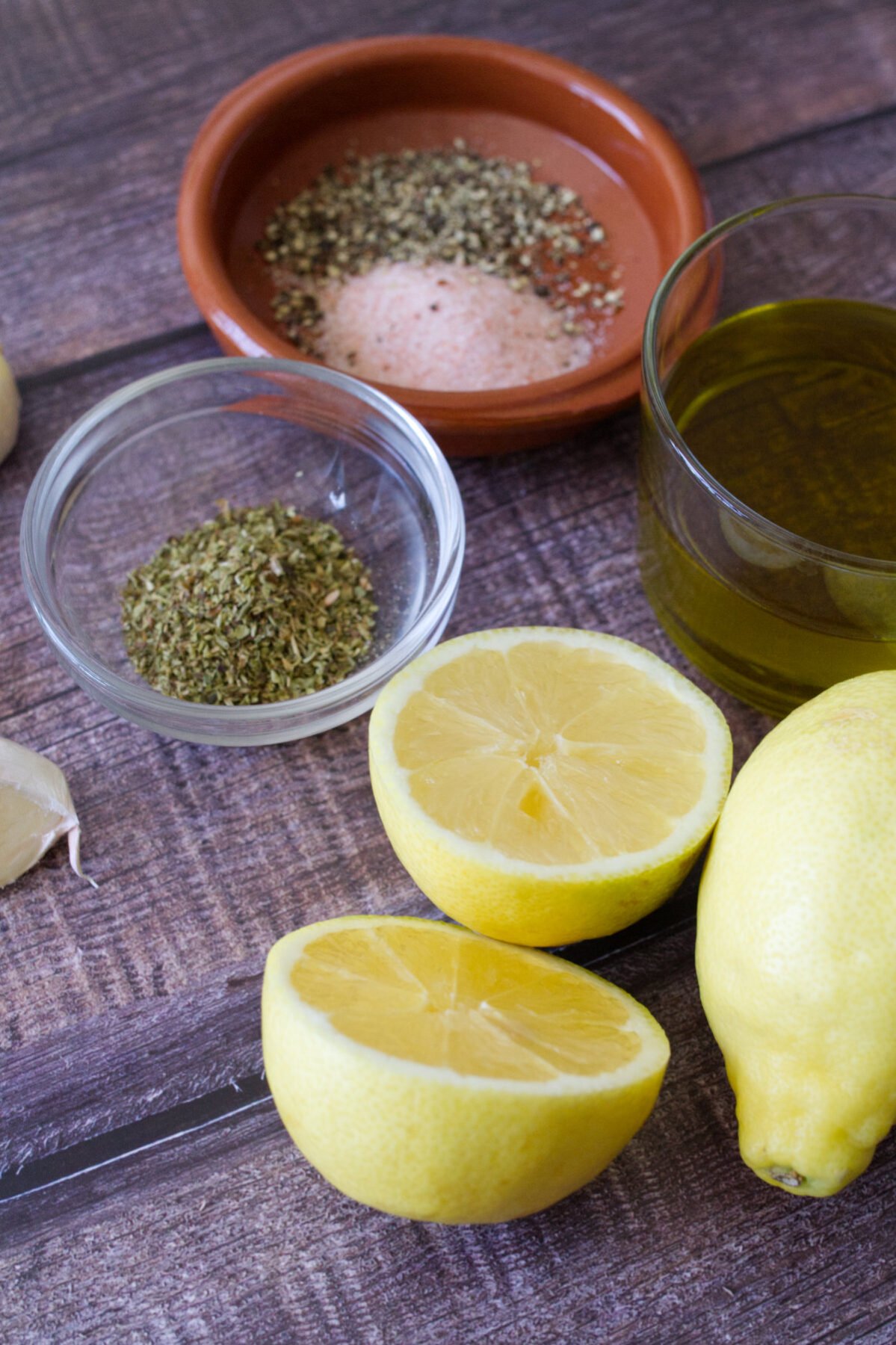
Marinades
The beauty of marinades is how easily they can enhance food flavors and quickly and easily elevate your cooking to the next level. Marinating chicken breasts is easy, and for this marinade, I went with the classic strategy for marinade ingredient ratios: the 3:1 oil-to-acid ratio.
What is the Oil-to-Acid Ratio in Marinades?
The oil-to-acid ratio is essential in marinades and cooking, as it balances flavors and ensures effective marination. The standard guideline for most marinades and vinaigrettes is a 3:1 ratio of oil to acid.
The oil-to-acid ratio in marinades serves the following purposes:
- Tenderizing: Acidic ingredients like vinegar, citrus juice, or wine help break down proteins in meat, making it more tender. This recipe uses freshly squeezed lemon juice for the acidic element.
Flavor Distribution: Oil carries fat-soluble flavors and ensures the even distribution of the acidic components. I prefer extra virgin olive oil for its flavor and notable health benefits but you can use virgin olive oil too.
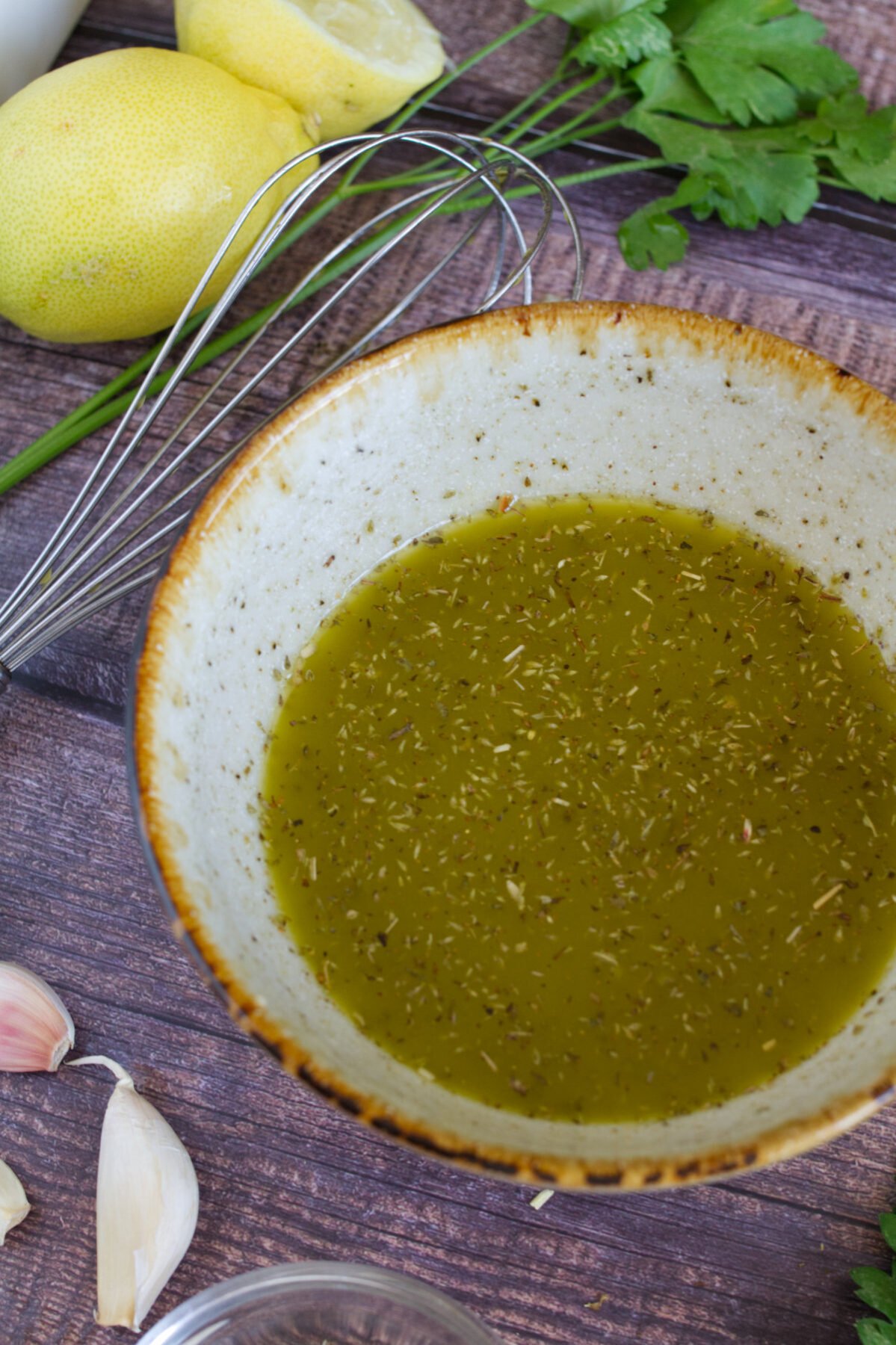
How to Stop Chicken Breast From Drying Out in The Oven
Chicken breast has a tendency to dry out in the oven if you’re not careful. There are a few ways to stop that from happening that will greatly improve the chances of achieving moist and flavorful chicken breasts.
For this recipe, I went with marinating and then baking the chicken breasts covered with aluminum foil at a higher temperature, then letting it rest before serving.
1. Marinating
Marinating adds flavor, makes the meat more tender, and can help keep the chicken breasts moist. Marinate the meat for at least 3 hours and overnight if you want a more intense flavor. For this recipe, I opted for a classic olive oil and lemon marinade with just 6 ingredients. Sometimes, it’s nice to keep things simple as your main will pair with so many sides. Here are some great side dishes that work well with this chicken recipe:
2. Covering with Foil
Covering the chicken can help retain moisture so cover it with aluminum foil before baking. Bake as usual, uncovering for the last 5-10 minutes to brown if desired. If you uncover it, keep the foil as you’ll need this when you rest the chicken.
3. Cook on a High Heat for Shorter Time
Cooking at a higher temperature for a shorter time can also help retain moisture. With this in mind, it’s also important to preheat the oven and ensure it has reached the right cooking temperature before adding the chicken to the oven.
4. Use a Meat Thermometer
Ensuring the chicken is cooked to the right internal temperature without overcooking is crucial to keeping your chicken breast juicy and tender. For this, I recommend investing in a meat thermometer.
To use a meat thermometer, simply insert the metal probe into the center of the thickest part of the chicken breast and check the internal temperature has reached 165°F (74°C). Once you’ve reached that temperature, remove the chicken immediately from the oven and remove the foil (if you haven’t already to brown it). Remember to save the foil for the step below.
5. Resting the Chicken
Allowing the chicken to rest after cooking lets the juices redistribute. This is an important step and shouldn’t be skipped. All you need to do is remove the foil (or put it back on if you took it off to brown) and allow the foil to loosely cover the chicken. Let the chicken rest for 5-10 minutes, then serve.
Let me know how yours turns out in the comments below. Happy cooking!
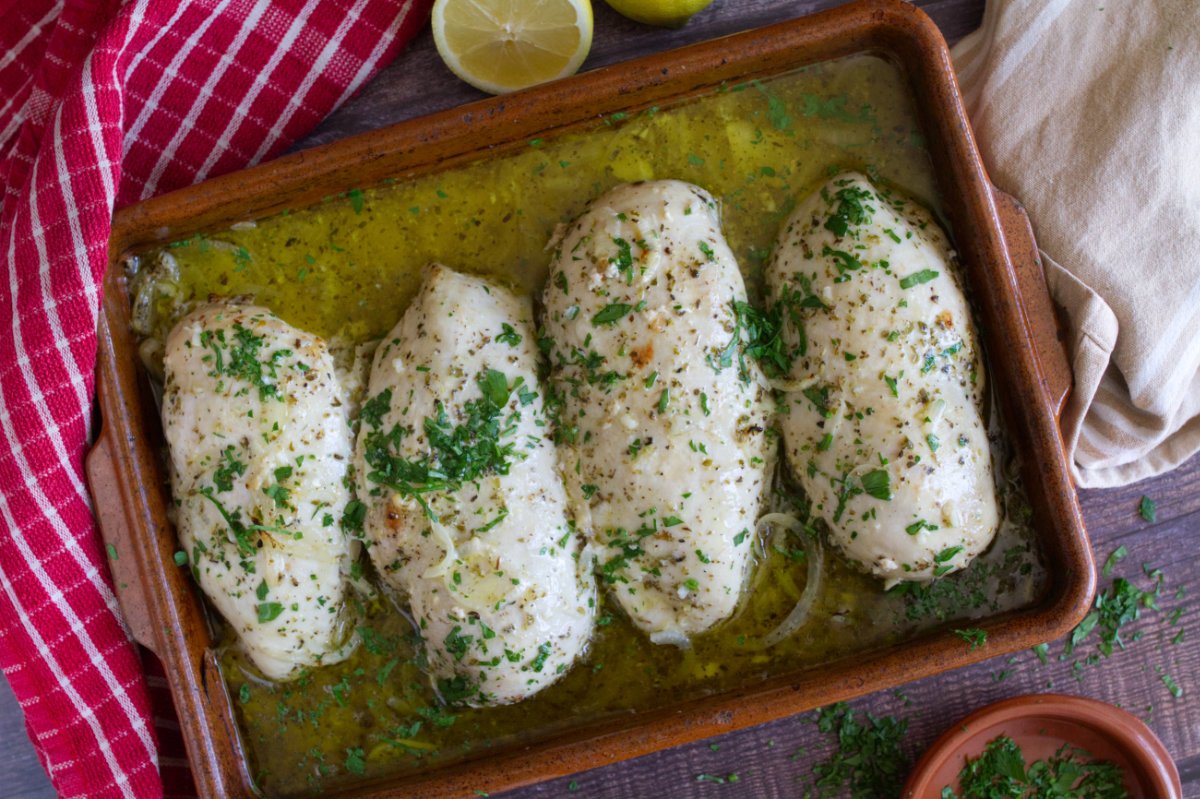
How Long to Marinate Chicken?
The optimal marination time for chicken thighs can vary depending on the marinade ingredients and the desired flavor intensity. Here are some general guidelines:
Basic Marination Times
- Quick Marination:
- 15 to 30 minutes: If you are short on time, even a quick marination can impart some flavor and moisture to the chicken. This is suitable for marinades that are primarily based on oil and herbs or mild acids like yogurt or buttermilk.
- Standard Marination:
- 2 to 4 hours: This is the most common marination time for chicken. It allows enough time for the flavors to penetrate the meat without risking a change in texture. Marinades with a moderate amount of acid like this recipe (vinegar, lemon juice, wine) are suitable for this duration.
- Extended Marination:
- Overnight (8 to 12 hours): For maximum flavor absorption, marinating chicken overnight is ideal. This is particularly useful for thicker cuts of chicken. However, be cautious with highly acidic marinades (containing lots of citrus or vinegar), as prolonged exposure can break down the proteins too much, resulting in a mushy texture.
Nutrition Facts
| Serving size: Main 300 g | |
| Servings: 4 | |
| Amount per serving | |
| Calories | 492 |
| % Daily Value* | |
| Total Fat 27.4g | 35% |
| Saturated Fat 3g | 15% |
| Cholesterol 160mg | 53% |
| Sodium 712mg | 31% |
| Total Carbohydrate 4.1g | 2% |
| Dietary Fiber 0.7g | 3% |
| Total Sugars 1.3g | |
| Protein 53.6g | |
| Vitamin D 0mcg | 1% |
| Calcium 36mg | 3% |
| Iron 1mg | 8% |
| Potassium 1003mg | 21% |
| *The % Daily Value (DV) tells you how much a nutrient in a food serving contributes to a daily diet. 2,000 calorie a day is used for general nutrition advice. | |
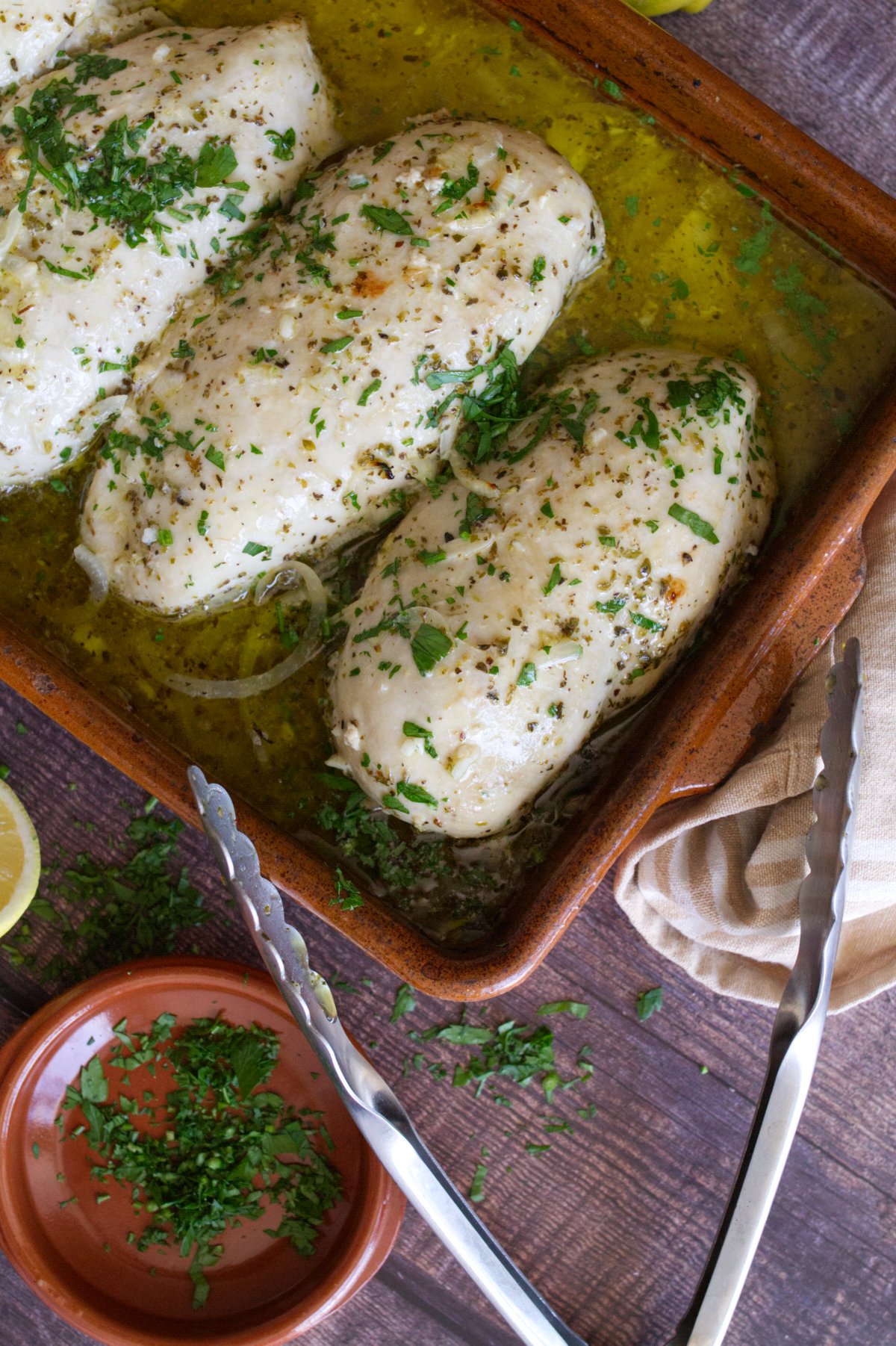
More Mediterranean Chicken Recipes:
- Healthy Mediterranean Chicken in a Tangy Lemon, Oil, and Herb Marinade
- Baked Mediterranean Chicken Thighs
- Pan-fried Greek Chicken Souvlaki With Creamy Tzatziki Sauce
- Za’atar Chicken with Leek, Artichoke Hearts, and Kalamata Olives
- One-pan Greek Chicken thighs with roast veg
- Mediterranean Chicken Meatballs with Couscous and a Tangy Greek Yogurt Dressing
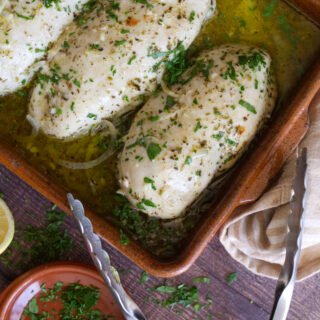
Mediterranean Chicken Recipe – The Perfect Summer Chicken Recipe with a Tangy Olive Oil and Lemon Marinade
Equipment
- Large casserole dish
- Small bowl (for mixing the marinade)
- Cooking tongs
- Garlic press
- Plastic food wrap
- Meat thermometer
Ingredients
For the Chicken:
- 1 kg 32 oz. Chicken breast meat
- 1 small white onion sliced fine
- ½ glass of dry white wine
- 3-4 garlic cloves loosely chopped
- Dash of oregano
- Fresh parsley for garnish
- 1 lemon cut into wedges (optional)
For the Mediterranean Olive Oil Marinade:
- 1/2 cup olive oil
- 1/4 cup fresh lemon juice
- 4 cloves garlic minced
- 1 tablespoon dried oregano
- 1 tsp salt we prefer fine Pink Himalayan Salt
- 1/2 tsp black pepper
Instructions
Step 1 – Prepare Marinade
- Add the olive oil and lemon juice to a small bowl, and whisk until you see the ingredients begin to emulsify. This should only take around 10 seconds.1/2 cup olive oil, 1/4 cup fresh lemon juice
- Add the minced garlic, dried oregano, and salt and pepper.4 cloves garlic, 1 tablespoon dried oregano, 1 tsp salt, 1/2 tsp black pepper
- Whisk again for around 30 seconds.
Step 2 – Prepare and Marinate Chicken
- In a large oven-safe casserole dish, add a splash of oil to the bottom of the dish. Add the chicken breasts, sliced onion, and garlic.1 kg 32 oz. Chicken breast meat, 1 small white onion, 3-4 garlic cloves
- Drizzle with the olive oil and lemon marinade and mix well, rotating chicken breasts so they are covered evenly with the marinade. (Note: the onion and garlic will move to the bottom of the pan, this is good as it gives the chicken a better opportunity to cook evenly.
- Pour the white wine around the chicken breasts and sprinkle with a dash of dried oregano.½ glass of dry white wine, Dash of oregano
- Cover the dish with plastic food wrap and marinate in the fridge for around 3-4 hours*
Step 3 – Bake Chicken Breasts
- Preheat the oven to 425°F (220°C).
- Remove the chicken from the fridge and bring to room temperature. Cover with aluminum foil before baking.
- Bake the chicken breasts for 20-25 minutes, depending on their size.
- If you want to brown the meat, take the foil off for the last 5-10 minutes in the oven. Keep the foil though as you’ll need it when you rest the chicken.
- Use a meat thermometer and check for an internal temperature of 165°F (74°C).
- Loosely arrange the foil over the chicken, and let the chicken rest for 5-10 minutes before serving.Fresh parsley, 1 lemon

